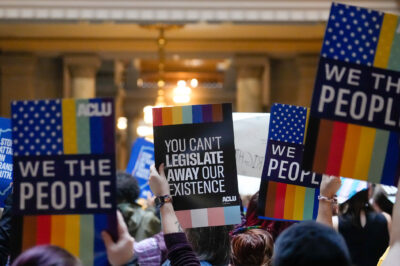ACLU Urges Supreme Court to Confirm that the President is Not Above the Law, Enforce Subpoenas for Trump Documents
WASHINGTON — The American Civil Liberties Union today filed friend-of-the-court briefs with the Supreme Court arguing the president should comply with subpoenas and hand over his personal finance documents. In the briefs, the ACLU argues that no one, not even the president, is above the law. The cases, Trump v. Mazars/Trump v. Deutsche Bank AG and Trump v. Vance, will both be argued on March 31.
The amicus curiae brief for Trump v. Mazars/Trump v. Deutsche Bank AG is authored by former U.S. Solicitor General Don Verrilli and Brendan Gants of Munger, Tolles & Olson LLP, and filed with the ACLU of the District of Columbia. The amicus curiae brief for Trump v. Vance is filed in conjunction with the New York Civil Liberties Union and authored by former ACLU Legal Director Steven R. Shapiro and Sam Shapiro of Emery Celli Brinckerhoff & Abady LLP.
David Cole, ACLU national legal director, addressed the importance of these cases:
“No one is above the law, including President Trump. His office does not protect him or his accountants from complying with legal requests for documents such as these subpoenas. Should Trump be permitted to block his accountant from complying with the law and congressional oversight, it would put the rule of law and the separation of powers at risk.
“These cases go to the core of our democracy. The president, like all of us, must respond to duly issued subpoenas. He should not be permitted to hide behind the cover of his office, particularly when the demanded documents do not involve official acts of the president at all. If Presidents Washington, Nixon, and Clinton all had to respond, surely President Trump does, too.”
In the Trump v. Mazars/Trump v. Deutsche Bank AG brief, the ACLU argues that Congress has the constitutional authority to investigate the executive branch, which includes the right to demand documents from the president or other members of the executive branch. Trump cannot block his accountant or bank from handing over financial documents regarding his personal affairs. Ruling otherwise would undermine the checks and balances central to our constitutional system. This is not the first time these demands have been made. If Congress had the authority to investigate Watergate and Whitewater, it can investigate Trump.
In Trump v. Vance, the ACLU also argues that Trump does not have the right to absolute immunity from a grand jury subpoena for similar documents simply because of his office. The subpoenas, directed to his accountant for personal financial records, impose no burden on his official duties. No previous president has asserted such complete immunity as Trump has. The Supreme Court should enforce the subpoenas.
The brief for Trump v. Mazars/Trump v. Deutsche Bank AG is available online here: https://www.aclu.org/legal-document/trump-v-mazarstrump-v-deutsche-bank-ag-aclu-amicus-brief
The brief for Trump v. Vance is available online here: https://www.aclu.org/legal-document/trump-v-vance-aclu-amicus-brief
Stay Informed
Every month, you'll receive regular roundups of the most important civil rights and civil liberties developments. Remember: a well-informed citizenry is the best defense against tyranny.



